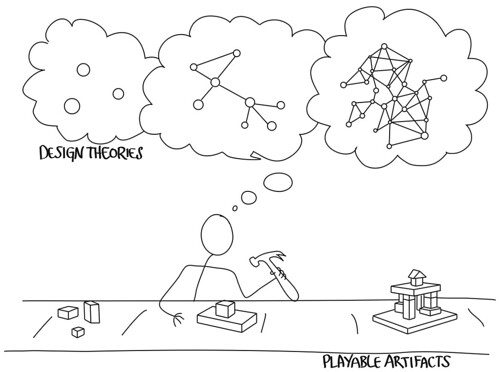 “Jazz Band Revolution” …. Trust me, this is a great idea. A fellow EIS labmate recently gave a class presentation about the “Edutainment Fail.” To its credit, edutainment is responsible for my first interactions with desktop computers. Games such as Oregon Train, Logo Writer, some lemonade stand game, and that typing game were widely used in my early primary school years. I suppose as games became more commercially available, the novelty of games in education were upstaged. Still, it’s apparent that there is a great deal of learning that goes into playing some of the most popular games today, so it begs the question… Why aren’t games used for educational purposes more? Many bridges are in process being built to overcome the gap between the motivation to be entertained and the motivation to learn. Similarly, there are many educational avenues from the experiencing to building of interactive experiences– whether it is to learn about the technology itself or to be engaged by the technology to learn. Let’s be honest, everyone knows that games are more than just entertainment, yet why are they mostly seen as entertainment– If I am willing to learn for the sake of being entertained, surely, I am willing to learn USEFUL things for the sake of being entertained (if nothing else). Being entertained should be assumed for all games; asking for a game that can entertain is like asking for a drink that will quench thirst. Albeit, not all drinks will quench thirst, but we have more options than just water to quench our thirsts. So listen up Activision, Harmonix, and Konami: Games are for more than just quenching my thirst for entertainment.
“Jazz Band Revolution” …. Trust me, this is a great idea. A fellow EIS labmate recently gave a class presentation about the “Edutainment Fail.” To its credit, edutainment is responsible for my first interactions with desktop computers. Games such as Oregon Train, Logo Writer, some lemonade stand game, and that typing game were widely used in my early primary school years. I suppose as games became more commercially available, the novelty of games in education were upstaged. Still, it’s apparent that there is a great deal of learning that goes into playing some of the most popular games today, so it begs the question… Why aren’t games used for educational purposes more? Many bridges are in process being built to overcome the gap between the motivation to be entertained and the motivation to learn. Similarly, there are many educational avenues from the experiencing to building of interactive experiences– whether it is to learn about the technology itself or to be engaged by the technology to learn. Let’s be honest, everyone knows that games are more than just entertainment, yet why are they mostly seen as entertainment– If I am willing to learn for the sake of being entertained, surely, I am willing to learn USEFUL things for the sake of being entertained (if nothing else). Being entertained should be assumed for all games; asking for a game that can entertain is like asking for a drink that will quench thirst. Albeit, not all drinks will quench thirst, but we have more options than just water to quench our thirsts. So listen up Activision, Harmonix, and Konami: Games are for more than just quenching my thirst for entertainment.
This is a preview of
Edutainment and Lessons “Learned” from Commercial Video Games: Jazz Band Revolution
.
Read the full post.






 This summer, I’m working with Matt MacLaurin at Microsoft Research on Kodu Game Lab. For those of you who aren’t familiar, Kodu is an environment for people with no programming experience to quickly create games. Its visual programming language is designed to be intuitively understandable and its library of characters and objects facilitate rapid game development. If you’re interested in checking it out yourself, it’s currently available for the very reasonable price of $5 through X-Box Live Arcade.
This summer, I’m working with Matt MacLaurin at Microsoft Research on Kodu Game Lab. For those of you who aren’t familiar, Kodu is an environment for people with no programming experience to quickly create games. Its visual programming language is designed to be intuitively understandable and its library of characters and objects facilitate rapid game development. If you’re interested in checking it out yourself, it’s currently available for the very reasonable price of $5 through X-Box Live Arcade.








